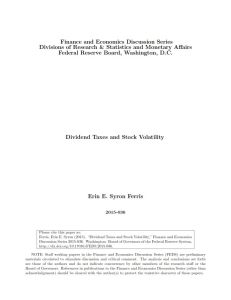Join getAbstract to access the summary!

Join getAbstract to access the summary!
Erin E. Syron Ferris
Dividend Taxes and Stock Volatility
Federal Reserve Board, 2015
What's inside?
America’s 2003 dividend tax cut gave equity-compensated managers incentives to keep stock price volatility low, potentially harming shareholders.
Recommendation
When adjusting the tax code, policy makers and economists may account for possible effects on stock prices, but not necessarily on stock volatility or on how changes in either could influence equity-compensated executives’ behavior on the job. This technical report by economist Erin E. Syron Ferris dives into complex analytics to see how the United States’ 2003 tax cut on dividends affected share prices, volatility and managerial risk aversion. Highly compensated individuals, including corporate executives, benefitted the most from the tax drop. But it may also have incentivized them to reduce price volatility, potentially harming shareholder returns. getAbstract suggests this methodical investigation to tax experts, remuneration specialists and portfolio analysts.
Summary
About the Author
Erin E. Syron Ferris is an economist at the Board of Governors of the Federal Reserve System.
















Comment on this summary